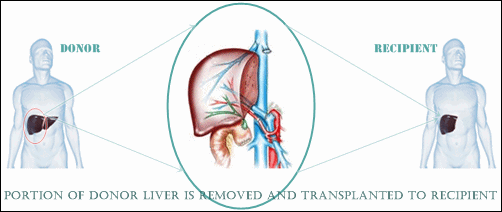
LIVER TRANSPLANT
Liver transplantation is a surgical procedure to remove a diseased liver and replace it with a healthy liver from a donor. A liver transplant is required when functioning of a liver becomes impaired or when the liver stops working. The most common reason for liver transplantation in adults is cirrhosis, a disease in which healthy liver cells are killed and replaced with scar tissue. A liver transplant nowadays is a well accepted treatment option for end-stage liver disease and acute liver failure. Many people have had liver transplants and now lead normal lives. There are three types of Liver Transplant Surgeries:
- Orthotropic transplantation- The orthotopic approach requires replacing the recipient liver with the donor liver. After the donor liver is removed, preserved and packed for transport, it must be transplanted into the recipient within 12 to 18 hours. The surgery begins by removing the diseased liver from the four main blood vessels and other structures that hold it in place in the abdomen. After the recipient's liver is removed, the new healthy donor liver is then connected and blood flow is restored. The final connection is made to the bile duct, a small tube that carries bile made in the liver to the intestines
- Heterotrophic transplantation- Heterotopic Transplantation surgery involves the addition of a healthy donor liver at another site, while the diseased liver is left intact. This liver transplant surgery procedure is performed when the doctor is of the opinion that the diseased liver might recover. The healthy liver is attached very near to the original liver. If the liver recovers, the other organ shrivels away. If not, then the original one shrivels and the donor liver performs the body functions
- Reduced-size liver transplants- Reduced-size Liver Transplantation is most often performed on children and involves the transplanting a part of the healthy donor liver into a patient. This procedure is performed when 15-20% of the original liver is intact. This way, one donor liver can be used for two successful transplants
INDICATIONS FOR LIVER TRANSPLANT INCLUDE:
- Hepatitis B
- Hepatitis C
- Alcohol induced cirrhosis
- Autoimmune Hepatitis
- Liver tumors
- Acute/fulminant liver failure
KEY POINTS:
- Liver transplants provide patients a chance for a longer, more active life in the final stages of liver disease or end-stage liver disease
- If the transplant is performed before the recipient's health deteriorates, he or she is better able to tolerate the surgery and recovers more quickly
- The donors and recipients recover quickly, the donors are discharged in about a week and the recipients in 2 to 3 weeks
#IVF, #IVF in India, #Fertility Treatment, #Fertility Treatment Abroad, #Infertility, #Infertility Treatment Abroad, #Surrogacy, #Surrogacy in India, #Savings, #Affordable Healthcare, #ICSI, #ICSI in India, #India, #Paradigm Healthcare, #Medical Travel, #Medical Tourism, #Treatment Abroad, #Treatment in India, #Surgery, #Low Cost Surgery, #Best IVF, #Best Surrogacy, #IVF Clinic in India, #Rotunda, #Kaberi Banerjee, #Rita Bakshi, #International Fertility Centre, #Indira Hinduja, #Gautam Allahbadia, #Dr.Malpani, #Shivani Sachdev, #Nova Fertility, #Shweta Mittal, #Anoop Gupta, #Dr.Pai, #Fertility Specialist, #Doctors, #Surgeons, #Gay Surrogacy, #Highest Success Rate in IVF, #Highest Success Rate in Surrogacy, #Low Cost Surrogacy, #Best Prices, #Best Quality, #Egg-Donor, #PGD, #Pre-implantation Genetic Diagnosis
IVF | IVF in India | ICSI | IUI | Surrogacy | Surrogacy in India | Medical Travel | Medical Tourism
